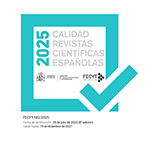The women of the National Museum of Anthropology: a narrative of the absent at the Aztec exhibit
Abstract
Mexico’s National Museum of Anthropology, founded in 1964, functions as a legitimation space for Mexican national culture, and an ideologization space that reproduces a particular museographic discourse. The discourse that is shown within the museum, specifically the Aztec room, is partial and stereotyped, hierarchizing masculine over feminine. This article seeks to show the relationship of what is shown in the museum and the decoloniality theory, the last of which comes from the modernity-coloniality binomial, this will show that the tour of the museum, and the Aztec room, are part of a lineal evolutionist thinking, within which the Aztec feminine figure is thrown to the side.
Downloads
Article download
License
In order to support the global exchange of knowledge, the journal Complutum is allowing unrestricted access to its content as from its publication in this electronic edition, and as such it is an open-access journal. The originals published in this journal are the property of the Complutense University of Madrid and any reproduction thereof in full or in part must cite the source. All content is distributed under a Creative Commons Attribution 4.0 use and distribution licence (CC BY 4.0). This circumstance must be expressly stated in these terms where necessary. You can view the summary and the complete legal text of the licence.










